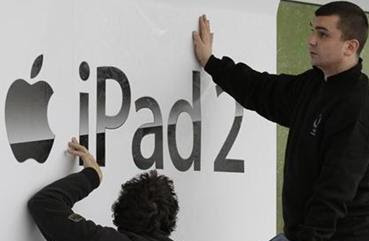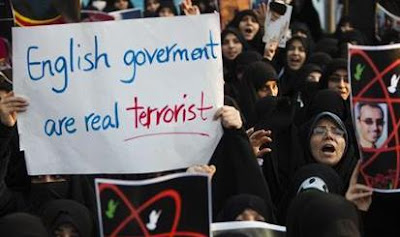(Reuters) - Iranian protesters stormed two British diplomatic compounds in Tehran on Tuesday, smashing windows, torching a car and burning the British flag in protest against new sanctions imposed by London.
Britain said it was outraged and warned of "serious consequences." The U.N. Security Council condemned the attacks "in the strongest terms."
U.S. President Barack Obama said he was disturbed by the incident and called on Iran to hold those responsible to account.
The attacks come at a time of rising diplomatic tension between Iran and Western nations who last week imposed fresh sanctions over Tehran's nuclear program, which they believe is aimed at achieving the capability of making an atomic bomb.
Iran, the world's fifth biggest oil exporter, says it only wants nuclear plants to generate electricity.
The embassy storming is also a sign of deepening political infighting within Iran's ruling hardline elites, with the conservative-led parliament attempting to force the hand of President Mahmoud Ahmadinejad and expel the British ambassador.
"Radicals in Iran and in the West are always in favor of crisis ... Such radical hardliners in Iran will use the crisis to unite people and also to blame the crisis for the fading economy," said political analyst Hasan Sedghi.
Several dozen protesters broke away from a crowd of a few hundred outside the main British embassy compound in downtown Tehran, scaled the gates, broke the locks and went inside.
Protesters pulled down the British flag, burned it, and put up the Iranian flag, Iranian news agencies and news pictures showed. Inside, the demonstrators smashed windows of office and residential quarters and set a car ablaze, news pictures showed.
One took a framed picture of Queen Elizabeth, state TV showed. Others carried the royal crest out through the embassy gate as police stood by, pictures carried by the semi-official Fars news agency showed.
All embassy personnel were accounted for, a British diplomat told Reuters in Washington, saying Britain did not believe that any sensitive materials had been seized.
Demonstrators waved flags symbolizing martyrdom and held aloft portraits of Supreme Leader Ayatollah Ali Khamenei who has the final say on matters of state in Iran.
Another group of protesters broke into a second British compound at Qolhak in north Tehran, the IRNA state news agency said. Once the embassy's summer quarters, the sprawling, tree-lined compound is now used to house diplomatic staff.
An Iranian report said six British embassy staff had been briefly held by the protesters. British Foreign Secretary William Hague said the situation had been "confusing" and that he would not have called them "hostages."
"Police freed the six people working for the British embassy in Qolhak garden," Iran's Fars news agency said.
A German school next to the Qolhak compound was also damaged, the German government said.
BRITAIN OUTRAGED
Police appeared to have cleared the demonstrators in front of the main downtown embassy compound, but later clashed with protesters and fired tear gas to try to disperse them, Fars said. Protesters nevertheless entered the compound a second time, before once again leaving, it said.
British Prime Minister David Cameron chaired a meeting of the government crisis committee to discuss the attacks which he said were "outrageous and indefensible."
"The failure of the Iranian government to defend British staff and property was a disgrace," he said in a statement.
"The Iranian government must recognize that there will be serious consequences for failing to protect our staff. We will consider what these measures should be in the coming days."
The United States, alongside the European Union and many of its member states also strongly condemned the attacks.
There have been regular protests outside the British embassy over the years since the 1979 Islamic revolution that toppled the
U.S.-backed shah, but never have any been so violent.
The attacks and hostage-taking were a reminder of the 1979 takeover of the
U.S. embassy in Tehran carried out by radical students who held 52 Americans hostage for 444 days. The United States cut diplomatic ties with Iran after the hostage-taking.
All British embassy personnel were accounted for and safe, a British diplomat, who spoke on condition of anonymity, told Reuters in Washington.
The diplomat said the attack likely flowed from Britain's November 21 decision to impose new sanctions on Iran because of its nuclear program, including a ban on British financial institutions dealing with their Iranian counterparts.
"It's impossible, really, not to reach that conclusion," the diplomat said, suggesting that the protests may have been sparked by the Iranian authorities.
"In the past we have certainly had demonstrations that have ... been sanctioned, if not encouraged, by the government. I don't know about this one. I don't think we'd put it past them," said the diplomat.
"It's hard to imagine, in a place like Iran, that these were some kind of spontaneous (event)," said a State Department official who declined to be identified.
INFIGHTING
The demonstrations appeared to be a bid by conservatives who control parliament to press home their demand, passed in parliament last week and quickly endorsed by the Guardian Council on Tuesday, for the government to expel the British ambassador in retaliation for the sanctions.
A lawmaker had warned on Sunday that angry Iranians could storm the British embassy.
"Parliament officially notified the president over a bill regarding degrading the ties with Britain, obliging the government to implement it within five days," Fars news agency quoted speaker Ali Larijani as saying.
Ahmadinejad's government has shown no willingness to compromise on its refusal to halt its nuclear work, but has sought to keep channels of negotiation open in an effort to limit the worst effects of sanctions.
An Iranian official told Reuters the storming of the British compounds was not planned by the government.
"It was not an organized measure. The establishment had no role in it. It was not planned," said the official, who declined to be identified. Iran's Foreign Ministry said it regretted the attacks and was committed to ensuring the safety of diplomats.
Police arrested 12 people who had entered the north Tehran compound, Fars said, quoting a police chief as saying they would be handed over to the judiciary.
Protesters said they planned to stage a sit-in at the gates of the north Tehran compound and would not move until they were told to do so by Iran's religious leaders.
Britain, along with the United States and Canada, imposed new unilateral sanctions on Iran last week, while the EU, France and Italy have all said financial measures against Tehran should be strengthened.



